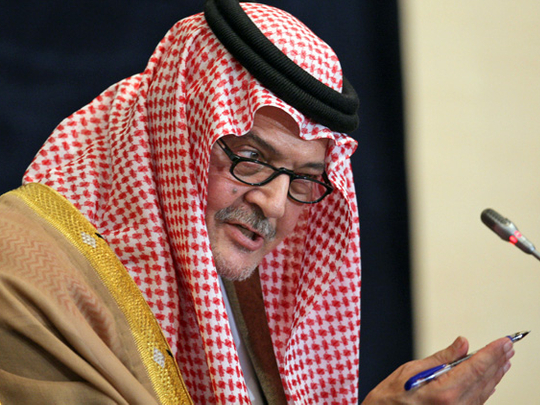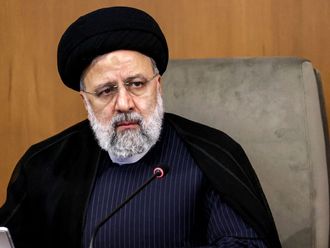
Beirut: Saudi Arabia has said that Syrians have a right to take up arms to defend themselves against the regime and accuses the Damascus government of "imposing itself by force," as concerns mount over a humanitarian crisis there.
In a rare televised news conference on Sunday, Saudi Foreign Minister Saud Al Faisal said the kingdom welcomed international efforts to broker a ceasefire in Syria but added that they have "failed to stop the massacres".
"Is there something greater than the right to defend oneself and to defend human rights?" he asked, adding that the Syrian people want to defend themselves. "The regime is not wanted by the people," he said.
"The regime is insisting on imposing itself by force on the Syrian people," he said.
Saudi Arabia and Qatar have been discussing military aid the to the Syrian opposition, but the U.S. and others have not advocated arming the rebels, in part out of fear it would create an even more bloody and prolonged conflict.
Sunni Saudi Arabia is wary of the wave of Arab Spring uprisings, particularly in nearby Bahrain, where a Shiite majority is demanding greater rights from its Sunni rulers. However, the kingdom strongly backs the largely Sunni uprising in Syria.
On Sunday Red Cross teams handed out food, blankets and medical kits in central Homs province, but the government blocked access to the worst-hit district of Baba Amr.
The humanitarian group was trying to help families who fled Baba Amr after a monthlong siege and took shelter in nearby villages, ICRC spokesman Hicham Hassan said in Geneva.
"The needs are so far mainly in the forms of food and also blankets because of the cold," Hassan said.
Government forces have blocked humanitarian access to Baba Amr since Friday, the day after troops seized it from rebels.
Opposition fighters had been in control of the neighborhood for several months, and a regime offensive on Homs that began in early February aimed to retake rebel-held neighbourhoods inside the city.
Syrian troops managed to take control of Baba Amr after nearly a month of intense and relentless shelling, and activists say hundreds were killed in the daily bombardments that led up to the final battle on Thursday. Some Baba Amr residents were killed when, in desperation, they dared to venture out of their homes to forage for food.
Activists have said residents face a humanitarian catastrophe in Baba Amr and other parts of Homs, Syria's third-largest city with a population of 1 million.
Electricity, water and communications have been cut off, and recent days have seen frigid temperatures and snowfall. Food was running low, and many are too scared to venture out.
The government had said it would allow the Red Cross into Baba Amr on Friday but then blocked their access, citing security concerns. In the meantime, activists accused Syrian forces of killing dozens of residents execution-style and burning homes in revenge attacks against those believed to be supporting the rebels.
As the brutal siege of Homs dragged on, Western pressure on President Bashar Al Assad intensified. The U.S. has called for Assad to step down, and Secretary of State Hillary Rodham Clinton said he could be considered a war criminal.
The European Union committed itself to document war crimes in Syria to set the stage for a "day of reckoning" for the country's leadership, in the way that former Yugoslav leaders were tried for war crimes in the 1990s by a special U.N. tribunal.
While they continue to appeal for unfettered access to Homs, Red Cross workers were focusing on distributing aid in the village of Abel, about three kilometres from Homs.
They hope to distribute aid in the neighborhoods of Inshaat and Tawzii on Monday.
Homs has emerged as a central battleground in the conflict, which started last March with protests calling for the ouster of authoritarian President Bashar Al Assad in some of the country's impoverished hinterlands.
The protests spread as the government waged a bloody crackdown on dissent, and many in the opposition have taken up arms to defend themselves and attack government troops.
The U.N. says more than 7,500 people have been killed in the uprising.
Syrian activists said more than a dozen artillery shells struck the town of Rastan, near Homs, killing at least three people Sunday and wounding others.
Syrian activists also reported clashes between rebel fighters and government troops in the northern Idlib province. The Britain-based Syrian Observatory for Human Rights said one soldier was killed and that the army was raiding homes in nearby villages following the rebel capture of an intelligence officer.
The bodies of two Western journalists who were killed two weeks ago in a government rocket attack in Homs arrived in France. The body of French photographer Remi Ochlik would remain there, while that of American reporter Marie Colvin would be sent to the U.S., the French Foreign Ministry said.
Also Sunday, Syrian ally China offered a proposal to end the violence, calling for an immediate cease-fire and talks by all parties. But it stood firm in its opposition to foreign intervention.
The proposal, posted on the Foreign Ministry's website, describes the situation in Syria as "grave" and calls for an immediate end to all violence as well as humanitarian relief and negotiations mediated by the U.N. and the Arab League.
But it rejects outside interference, sanctions and attempts at regime change.
"We oppose anyone interfering in Syria's internal affairs under the pretext of 'humanitarian' issues," the proposal said. "China does not approve of armed interference or pushing for 'regime change' in Syria and believes that use or threat of sanctions does not help to resolve the issue."
As international pressure against Assad's regime has grown, China and Russia have protected it from censure in the U.N. Security Council.
Beijing is usually reluctant to authorize sanctions or intervention against another country, fearing the precedent may one day be used against China's own authoritarian government.
Reflecting the Syrian conflict's echoes throughout the region, protesters in Lebanon's capital took to the streets in competing pro- and anti-Assad demonstrations Sunday. Masses of soldiers deployed to prevent clashes.
On the pro-Al Assad side, a few hundred waved Syrian flags and carried posters of Assad reading "May God protect you." Many echoed the Syrian government's explanation of the uprising, that a foreign conspiracy is driving the revolt.
"I came because I'm against destruction and destroying Syrian homes and cities," said Yousuff Al Durram, 27, an electrician from the eastern Syrian town of Dair Al Zour.
"The only way this crisis will end is when the Syrian people wake up and realize that there is a big conspiracy against Syria."
About 200 yards away, a few thousand protesters rallied against Al Assad.
Thirty-year-old Fatoun, from the coastal Syrian city of Aleppo, carried a sign reading "where are human rights?" She came to neighbouring Lebanon a few weeks ago after being briefly detained after a protest there and said she planned to collect aid to send home.
"If you ask them, most Syrians here won't say they are against the regime because they're scared of Syrian security," she said, not giving her last name for fear of arrest when she goes home.
"But many people realise that the regime has to go. Too many people have been killed."










